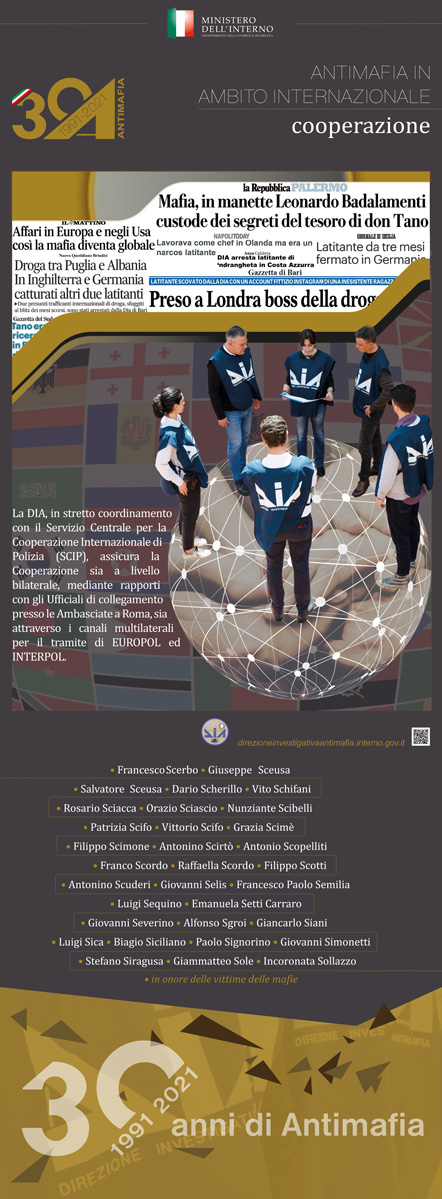

INTERNATIONAL LAW ENFORCEMENT COOPERATION
Within the international law enforcement cooperation, at bilateral and multilateral levels, the DIA drafts specific analysis reports aimed at outlining the evolutionary trends of transnational organized crime, supports single operational activities and organizes training sessions to disseminate the most effective methodologies in the fight against mafia crime.
In particular, transnational law enforcement cooperation is achieved by the DIA through the following instruments:
- cooperation – through the International Police Cooperation Service – with foreign Liaison Officers posted in Rome and with Italian Law Enforcement Attachés posted abroad;
- relational meetings with foreign counterparts to strengthen cooperation among the states in the fight against organized crime, promoting the antimafia culture and the law enforcement tools provided for by the Italian legal system;
- @ON Anti-mafia Network, approved on 04 December 2014 by the EU JHA Council which arose from a proposal put forward by the DIA with the purpose of strengthening international cooperation between Law Enforcement Agencies (LEAs) against top level and mafia-style OCGs affecting EU Member State, focusing on OCGs themselves regardless of the crime committed. The organized crime groups and networks are mainly Italian, Euroasian. Albanian, outlaw motorcycle gangs but also the new OCGs (such as: Chinese, Nigerian, Turkish etc.);
- creation of Task Forces within the Italian and foreign Law Enforcement Agencies in order to strengthen information exchange through the sharing of the best investigative practises so to develop common strategies to combat transnational organized crime;
- information and operational exchanges between foreign law enforcement agencies through INTERPOL and EUROPOL channels and cooperation with the related “Analysis Projects” (information processing systems on some specific areas of transnational organized crime) among which: the “ITOC” project concerning Italian organized crime groups rooted abroad; the “EEOC” project dealing with crime from Eastern Europe, mainly from former Soviet Union. Last but not least, mention should be made of the ICARO project – on the detection and seizure of illicit assets – and the “SUSTRANS” project on the analysis of suspicious financial operations to fight against international money laundering;
- participation in the I-CAN project, as a main tool launched in 2020 by the Italian Department of Public Security together with the General Secretariat of the International Criminal Organization, INTERPOL, to raise the awareness and disrupt the ramifications of the ‘ndrangheta phenomenon at global level;
- training courses destined for foreign counterparts interested in acquiring the methodologies for combating mafia organizations provided for by the Italian legal system. The DIA also participates in training initiatives organized at international level by providing its expertise with particular regard to preventive activities (control and monitoring of public tenders, preventive and anti-money laundering measures).



